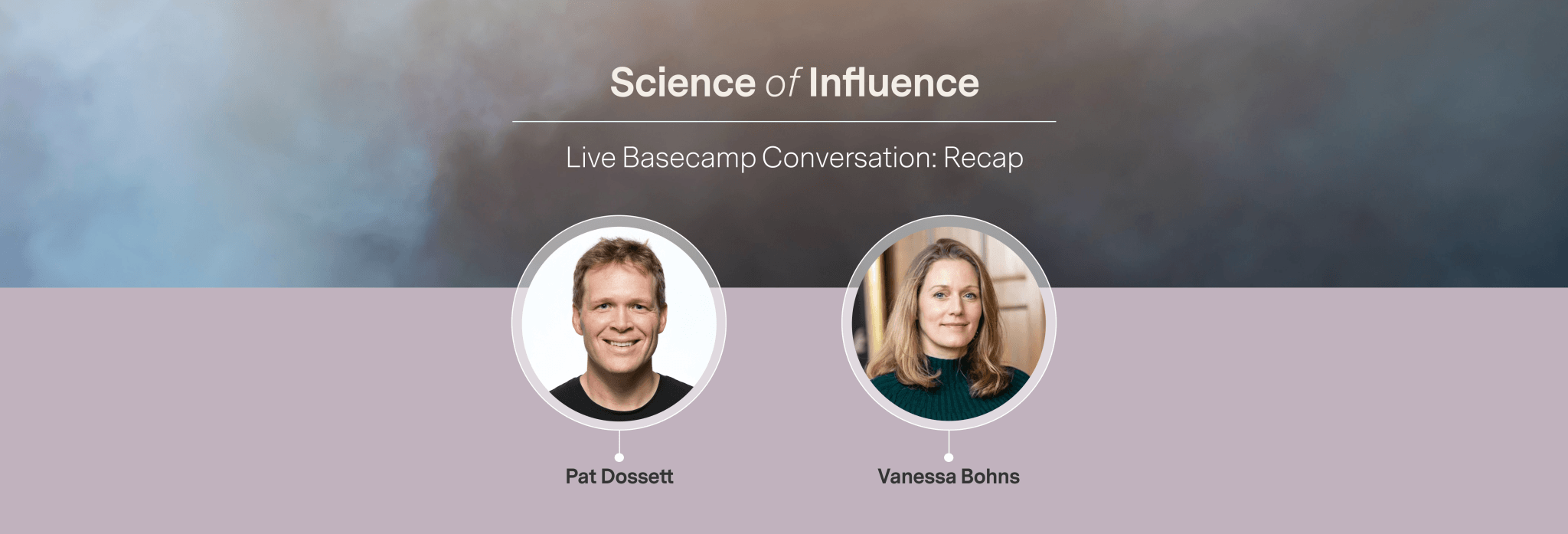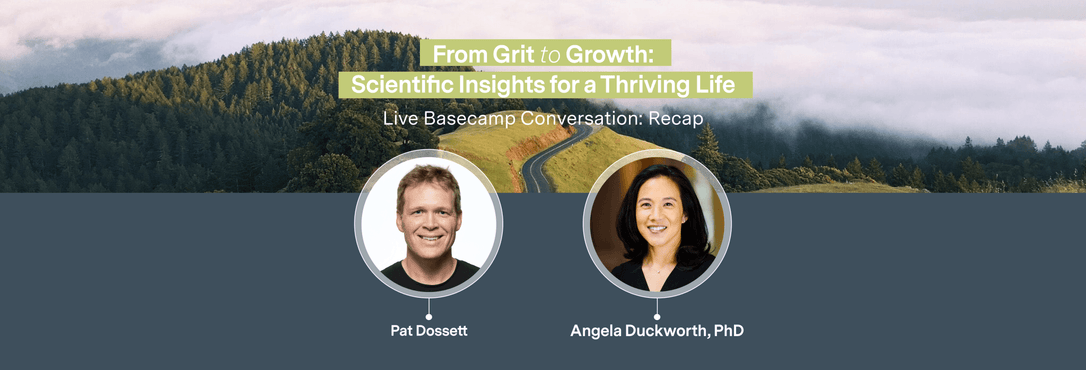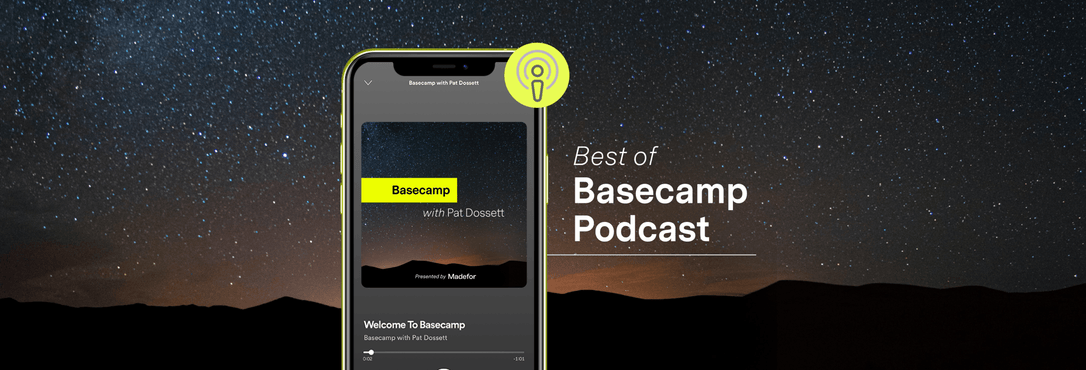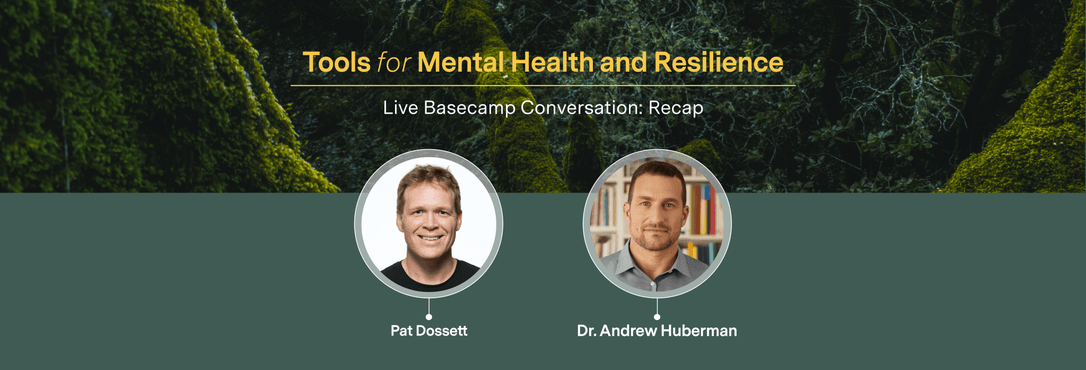Social psychologist, award-winning researcher and teacher, and professor of organizational behavior at Cornell University, Dr. Vanessa Bohns is an expert on influence. She is the author of the newly published book, You Have More Influence Than You Think: How We Underestimate Our Power of Persuasion, and Why It Matters. During this month’s live Basecamp conversation, Dr. Bohns sits down with Madefor Co-Founder, Pat Dossett, to talk about why we underestimate our influence, how we are unknowingly influencing others, and how to get what we want.
Why Do We Underestimate Our Influence?
We have an idea of what influence is and what it looks like, but we tend to think of more formal attempts of influence. For instance, a politician asking for money or your vote; basically, someone asking you for something. However, influence is often silent and invisible and lives in the minds of others where we can’t see it. What makes it even more elusive is that it’s cumulative and builds over time. Due to these factors, we often think we don’t have influence if we don’t see immediate tangible evidence of it such as winning a debate or getting a donation.
Since we can’t see how much we influence others, we have to guess. And wouldn't you know it, we are usually guessing incorrectly and underestimating our influence. What we don't realize is we also influence the others that are watching us having exchanges with others personally or on our social media accounts. We have a much larger audience than we think and our influential reach is more far-reaching than we believe.
Sorting Through The Liking Gap, Spotlight Effect, and Getting What You Want
Now that we've identified that formal influence is just a small part of the picture, why is it that we still think we don't wield the amount of influence we have? Factors such as the Liking Gap, Spotlight Effect, and the Default State of Trust all explain why we believe that we aren't liked as much as we are.
Let’s begin with the Liking Gap. When we meet someone and then they eventually walk away, we think they like us less and enjoy speaking with us less than they did. Why? Because while they are thinking about the whole experience and from a high-level view, we are thinking of all of our insecurities, which is the Spotlight Effect.
Spotlight Effect happens whenever we're insecure about something about ourselves like a new haircut, weight, sound of our voice, etc. We believe everyone's eyes are on us and focus on what we perceive as a flaw or defect. We become hyper self-conscious about the root of the insecurity and think we are less likable and less influential. In reality, the person or people we are interacting with aren’t paying attention to it at all. What’s especially interesting is that when we are not worried about something and just existing in our universe, thinking no one is paying attention to us, we are even more influential. People are paying attention to us more than we think. They see us on social media, with friends, or just in repose with ourselves. Upon observing us, they wonder why we're doing what we're doing and if they should do it too, often mimicking us. This shapes the social norms our society lives by.
We can't discuss influence without talking about why it's important, and let's be frank, we want to be influential because it aids us in getting the things we need. We often count on our influence because coming out and just asking someone is plain old scary, and we brace ourselves for rejection. In truth, we really shouldn't be worried about the ask. We believe the default setting people have when asked for something is to reject us, so we tend to tiptoe around what we want and not be clear or direct in our ask. The opposite is true; we have a Default State of Trust where we want to help others and be agreeable naturally. To get what we want, we simply need to be direct and honest along the lines of, "Here's what I'd like and why." For the best results, you want to make these requests in person, but if that isn’t possible video or phone chat is the next best thing.
People are more inclined to do something for you than you think. It feels good to be able to help someone. Think back to the last time you were about to help someone, in a small or big way, it felt great, right? As humans, we are centrally motivated to feel good about ourselves and connect to other people. Doing something for someone satisfies both of those internal needs.
How to Stop Underestimating Your Awesomeness
Now that you're armed with all of this information, how do you use it? Are you more influential than you've been believing? Ready to harness that power for yourself and the world? Try these three tips to bask in your own uniqueness, up your influencer status, make others feel good about themselves, and put more positive vibes out into the world.
1. Practice Getting Perspective. It's easy to assume we know what people are thinking; however, we are often wrong. The next time you are in a situation where you observe yourself falling into this trap, stop! Ask the person you're interacting with what they are feeling and experiencing instead of assuming you know. They'll appreciate you asking them, and you just upped your influence quotient!
2. Reframe. When we think about ourselves, we tend to focus on the negative. The next time you catch yourself having those “nobody likes me” or “I don’t really matter” thoughts, take to your journal and write down three reasons you feel that way. Now turn those negatives into positives by reframing them.
For instance, maybe you think others are less likely to befriend you because you’re opinionated. Make it positive by realizing some people like you for that exact reason – they can count on you to give an honest, informed opinion of the topic of conversation.
3. Pay it Forward. The next time you think a nice thought about someone, tell them. It can be in person, by phone, text, email, or in a note. Bonus: it'll give you both the warm fuzzies!
Like everything in life, it's a practice. You won't lose insecurities overnight, but when you work on them consistently, you'll start to see how influential you are. Then you can apply that knowledge to living your best life and helping others lead theirs.



